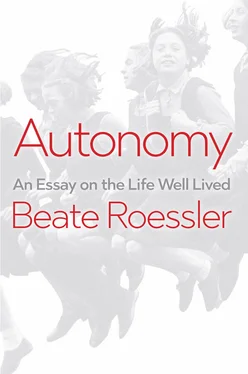1 Cover
2 Autonomy Autonomy In everyday life, we generally assume that we can make our own decisions on matters which concern our own lives. We assume that a life followed only according to decisions taken by other people, against our will, cannot be a well-lived life – we assume, in other words, that we are and should be autonomous. However, it is equally true that many aspects of our lives are not chosen freely: this is true of social relations and commitments but also of all those situations we simply seem to stumble into, situations which just seem to happen to us. The possibility of both the success of an autonomous life and its failure are part of our everyday experiences. In this brilliant and illuminating book, Beate Roessler examines the tension between failing and succeeding to live an autonomous life and the obstacles we have to face when we try to live our life autonomously, obstacles within ourselves as well as those that stem from social and political conditions. She highlights the ambiguities we encounter, examines the roles of self-awareness and self-deception, explores the role of autonomy for the meaning of life, and maps out the social and political conditions necessary for autonomy. Informed by philosophical perspectives but also drawing on literary texts, such as those of Siri Hustvedt and Jane Austen, and diaries, including those of Franz Kafka and Sylvia Plath, Roessler develops a formidable defense of autonomy against excessive expectations and, above all, against overpowering skepticism. Beate Roessler is Professor of Philosophy at the University of Amsterdam.
3 Dedication Dedication For Rebecca “Me wherever my life is lived, O to be self-balanced for contingencies” Walt Whitman, “Me Imperturbe”
4 Title Page Autonomy An Essay on the Life Well Lived Beate Roessler Translated by James C. Wagner polity
5 Copyright Page
6 Preface to the English edition
7 Preface
8 Introduction: Autonomy in Everyday Life Notes
9 1 What is Autonomy? A Conceptual Approach Remarks on the history of the concept Negative freedom, positive freedom, autonomy Conditions of individual autonomy Autonomy and rational plans Notes
10 2 Ambivalences Various forms of ambivalence Ambivalence as a disease of the will Is an ambivalent will a healthy will? The ambivalent self Conflicts of ambivalence as conflicts of identity Autonomy and the acceptance of conflicts Notes
11 3 Autonomy and the Meaning of Life Why do we value autonomy? Sisyphus contented Does the meaning of life consist in the satisfaction of desire? The objective meaning of life Mill’s crisis and subjective meaning in life When does the question of meaning arise? Notes
12 4 Autonomy, Self-Knowledge, and Self-Deception Self-knowledge and self-determination Self-deception: how can I be mistaken about myself? How can self-knowledge fail? On fundamental epistemic uncertainties The quantified self Notes
13 5 Autonomy, Self-Thematization, Self-Examination: From Diaries to Blogs Self-examination, self-control, reflection Why diaries? And which diaries? Autonomy in the diary: examples Blogs and the new technologies of self-examination What is the framework of autonomy? Notes
14 6 Autonomous Choice and the Good Life The question of the good life and perfectionism Happiness, autonomy, and meaning The significance of choosing: conditions of an autonomous decision Who actually chooses and in what context? Alienation (and authenticity) Virtue and character Notes
15 7 Private Life Why privacy? Dimensions of privacy Informational privacy, social relationships, and autonomy Autonomous persons in relationships (I) Autonomy and domestic privacy: autonomous persons in relationships (II) Privacy and democratic society Notes
16 8 Social Preconditions of Autonomy What are social conditions? The social constitution of autonomy Autonomy, ideology, and adaptive preferences Social opportunities and justice Between autonomy and oppression: limiting cases Notes
17 9 The Reality of Autonomy Autonomy is not an illusion The significance of social practices Social unfreedom and implicit bias Aspects of moral responsibility Autonomy and the life well lived Notes
18 Bibliography
19 Index
20 End User License Agreement
1 Cover
2 Table of Contents
3 Begin Reading
1 a
2 b
3 ii
4 iii
5 iv
6 vii
7 viii
8 ix
9 x
10 1
11 2
12 3
13 4
14 5
15 6
16 7
17 8
18 9
19 10
20 11
21 12
22 13
23 14
24 15
25 16
26 17
27 18
28 19
29 20
30 21
31 22
32 23
33 24
34 25
35 26
36 27
37 28
38 29
39 30
40 31
41 32
42 33
43 34
44 35
45 36
46 37
47 38
48 39
49 40
50 41
51 42
52 43
53 44
54 45
55 46
56 47
57 48
58 49
59 50
60 51
61 52
62 53
63 54
64 55
65 56
66 57
67 58
68 59
69 60
70 61
71 62
72 63
73 64
74 65
75 66
76 67
77 68
78 69
79 70
80 71
81 72
82 73
83 74
84 75
85 76
86 77
87 78
88 79
89 80
90 81
91 82
92 83
93 84
94 85
95 86
96 87
97 88
98 89
99 90
100 91
101 92
102 93
103 94
104 95
105 96
106 97
107 98
108 99
109 100
110 101
111 102
112 103
113 104
114 105
115 106
116 107
117 108
118 109
119 110
120 111
121 112
122 113
123 114
124 115
125 116
126 117
127 118
128 119
129 120
130 121
131 122
132 123
133 124
134 125
135 126
136 127
137 128
138 129
139 130
140 131
141 132
142 133
143 134
144 135
145 136
146 137
147 138
148 139
149 140
150 141
151 142
152 143
153 144
154 145
155 146
156 147
157 148
158 149
159 150
160 151
161 152
162 153
163 154
164 155
165 156
166 157
167 158
168 159
169 160
170 161
171 162
172 163
173 164
174 165
175 166
176 167
177 168
178 169
179 170
180 171
181 172
182 173
183 174
184 175
185 176
186 177
187 178
188 179
189 180
190 181
191 182
192 183
193 184
194 185
195 186
196 187
197 188
198 189
199 190
200 191
201 192
202 229
203 230
204 231
205 232
206 233
207 234
208 235
209 236
210 237
211 238
212 239
213 240
214 241
215 242
216 243
217 244
218 245
219 246
220 247
221 248
222 249
223 250
224 251
225 252
226 253
227 254
228 255
229 256
230 257
231 258
232 259
233 260
234 261
In everyday life, we generally assume that we can make our own decisions on matters which concern our own lives. We assume that a life followed only according to decisions taken by other people, against our will, cannot be a well-lived life – we assume, in other words, that we are and should be autonomous. However, it is equally true that many aspects of our lives are not chosen freely: this is true of social relations and commitments but also of all those situations we simply seem to stumble into, situations which just seem to happen to us. The possibility of both the success of an autonomous life and its failure are part of our everyday experiences.
Читать дальше












